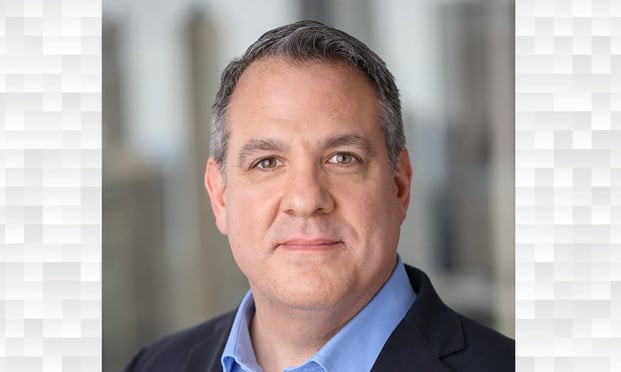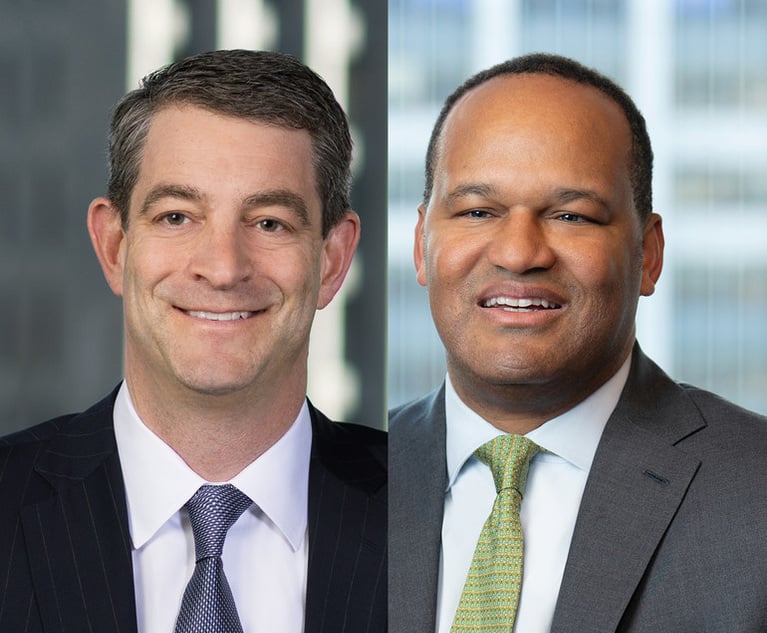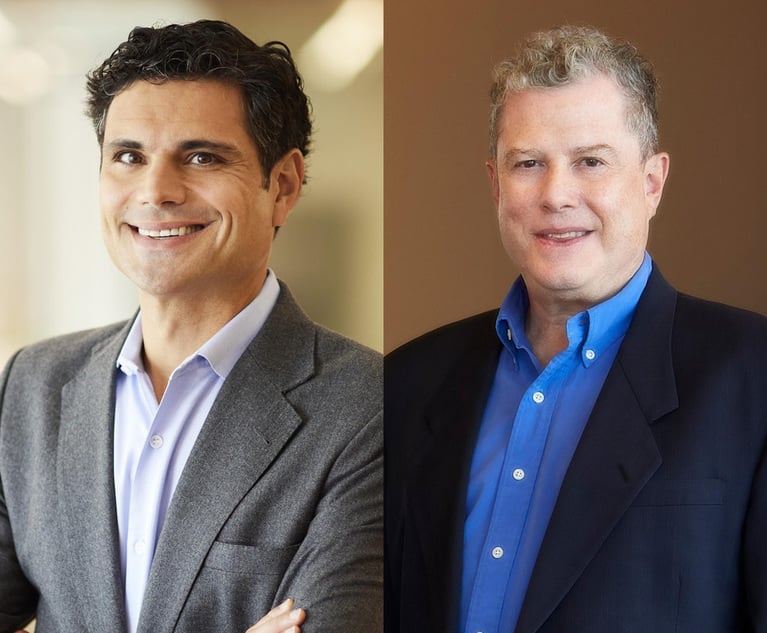Q&A: Baker McKenzie's Newly Hired 'Godfather' of Legal Operations
After pioneering legal operations at Aon Corp. and Archer Daniels Midland, David Cambria has taken his experience to a law firm for the first time.
July 13, 2018 at 01:02 PM
4 minute read
 David Cambria. The Godfather most recently emerging trend How do law firms benefit from having a “voice of the client” as part of their leadership team? There's a whole dynamic that happens between the law department and the C-suite, there's a whole dynamic that happens between the law department and the finance function, and the law department and the business function, where it's hard to understand the nuance of what you read about, or what you hear about, or what your clients are telling you. It actually brings a third dimension, and it brings it to life, in a way that—until you've lived it—it's hard to appreciate. How far along is this trend of hiring legal operations directors from the client side? It's fairly new, and I think in a large part because it takes a certain mindset—I think, a very open mindset—to bring in someone from in-house into a law firm to really start aligning the resources to the needs of the client. Legal operations is a topic getting a lot of airtime these days, but the reality of it is a bunch of us have been doing this a long time, 20 years or so. So you do tend to have varying degrees of readiness and sophistication from the legal operations side to actually start making that transition over to a law firm. While you see the number of legal operations folks growing on the in-house side, a lot of those folks are actually fairly new to the space and probably working through some of the things that more senior folks have addressed earlier in their career. The talent pool is a little smaller. Archer Daniels Midland also has operations spread around the world. The businesses are in two different industries, but are there any similarities between the two? Absolutely. I would say the complexity in different parts of the world—understanding how to address those complexities and realizing that the solutions that you have, while they may work in one part of the world, might not work in another—is a key component. Because you are on global platform and in a global organization, all of the workings of the world affect you in one way or another and impact the way you do business or deliver legal services. While we were at ADM, that was a focus of review for us, something you always had to consider in delivering legal services. At a firm like Baker, I think they have very similar concerns and things they look over and watch over. What do practicing lawyers need to know about legal operations? People tend to talk about legal operations as a role within the company, rather than a multi-disciplinary field where professionals collaborate to design and build systems to manage legal problems. Is there a degree of stubbornness that you have to overcome? No. Certainly there is inertia that you have to overcome in thinking about legal service delivery, but there is a massive amount of willingness and desire on both in-house and the law firm to figure out what that means and how to do that adeptly and in a way that's providing value. What do you expect the landscape for global firms to look like 10 years in the future? Their expertise, their capabilities are going to be what drives people to a firm like Baker to solve very complicated problems. The lawyers will really focus, at a global law firm, as legal integrators. [The concept was pioneered by consultant Bill Mooz and Indiana University Law professor Bill Henderson.] Legal integrators design systems and solutions. They pull together bespoke lawyers at the firm They help and run manage systems, and by systems, I don't just mean technology systems but really models that help deliver legal services. And they also pull into the mix legal specialists and subject matter expertise based on specific tasks, or allied professionals around data and processing and software technology. I think a global firm that manages those pieces and helps pull those all together is what the global firm of the future is going to look like.
David Cambria. The Godfather most recently emerging trend How do law firms benefit from having a “voice of the client” as part of their leadership team? There's a whole dynamic that happens between the law department and the C-suite, there's a whole dynamic that happens between the law department and the finance function, and the law department and the business function, where it's hard to understand the nuance of what you read about, or what you hear about, or what your clients are telling you. It actually brings a third dimension, and it brings it to life, in a way that—until you've lived it—it's hard to appreciate. How far along is this trend of hiring legal operations directors from the client side? It's fairly new, and I think in a large part because it takes a certain mindset—I think, a very open mindset—to bring in someone from in-house into a law firm to really start aligning the resources to the needs of the client. Legal operations is a topic getting a lot of airtime these days, but the reality of it is a bunch of us have been doing this a long time, 20 years or so. So you do tend to have varying degrees of readiness and sophistication from the legal operations side to actually start making that transition over to a law firm. While you see the number of legal operations folks growing on the in-house side, a lot of those folks are actually fairly new to the space and probably working through some of the things that more senior folks have addressed earlier in their career. The talent pool is a little smaller. Archer Daniels Midland also has operations spread around the world. The businesses are in two different industries, but are there any similarities between the two? Absolutely. I would say the complexity in different parts of the world—understanding how to address those complexities and realizing that the solutions that you have, while they may work in one part of the world, might not work in another—is a key component. Because you are on global platform and in a global organization, all of the workings of the world affect you in one way or another and impact the way you do business or deliver legal services. While we were at ADM, that was a focus of review for us, something you always had to consider in delivering legal services. At a firm like Baker, I think they have very similar concerns and things they look over and watch over. What do practicing lawyers need to know about legal operations? People tend to talk about legal operations as a role within the company, rather than a multi-disciplinary field where professionals collaborate to design and build systems to manage legal problems. Is there a degree of stubbornness that you have to overcome? No. Certainly there is inertia that you have to overcome in thinking about legal service delivery, but there is a massive amount of willingness and desire on both in-house and the law firm to figure out what that means and how to do that adeptly and in a way that's providing value. What do you expect the landscape for global firms to look like 10 years in the future? Their expertise, their capabilities are going to be what drives people to a firm like Baker to solve very complicated problems. The lawyers will really focus, at a global law firm, as legal integrators. [The concept was pioneered by consultant Bill Mooz and Indiana University Law professor Bill Henderson.] Legal integrators design systems and solutions. They pull together bespoke lawyers at the firm They help and run manage systems, and by systems, I don't just mean technology systems but really models that help deliver legal services. And they also pull into the mix legal specialists and subject matter expertise based on specific tasks, or allied professionals around data and processing and software technology. I think a global firm that manages those pieces and helps pull those all together is what the global firm of the future is going to look like.This content has been archived. It is available through our partners, LexisNexis® and Bloomberg Law.
To view this content, please continue to their sites.
Not a Lexis Subscriber?
Subscribe Now
Not a Bloomberg Law Subscriber?
Subscribe Now
NOT FOR REPRINT
© 2025 ALM Global, LLC, All Rights Reserved. Request academic re-use from www.copyright.com. All other uses, submit a request to [email protected]. For more information visit Asset & Logo Licensing.
You Might Like
View All
'None of Us Like It': How Expedited Summer Associate Recruiting Affects Law Students and the Firms Hiring Them

Latham's Lateral Hiring Picks Up Steam, With Firm Adding Simpson Practice Head, Private Equity GC
3 minute read

Leaning Into ‘Core’ Strengths, Jenner’s Revenue Climbs 17%, Profits Soar 23%
4 minute readTrending Stories
- 1Thursday Newspaper
- 2Public Notices/Calendars
- 3Judicial Ethics Opinion 24-117
- 4Rejuvenation of a Sharp Employer Non-Compete Tool: Delaware Supreme Court Reinvigorates the Employee Choice Doctrine
- 5Mastering Litigation in New York’s Commercial Division Part V, Leave It to the Experts: Expert Discovery in the New York Commercial Division
Who Got The Work
J. Brugh Lower of Gibbons has entered an appearance for industrial equipment supplier Devco Corporation in a pending trademark infringement lawsuit. The suit, accusing the defendant of selling knock-off Graco products, was filed Dec. 18 in New Jersey District Court by Rivkin Radler on behalf of Graco Inc. and Graco Minnesota. The case, assigned to U.S. District Judge Zahid N. Quraishi, is 3:24-cv-11294, Graco Inc. et al v. Devco Corporation.
Who Got The Work
Rebecca Maller-Stein and Kent A. Yalowitz of Arnold & Porter Kaye Scholer have entered their appearances for Hanaco Venture Capital and its executives, Lior Prosor and David Frankel, in a pending securities lawsuit. The action, filed on Dec. 24 in New York Southern District Court by Zell, Aron & Co. on behalf of Goldeneye Advisors, accuses the defendants of negligently and fraudulently managing the plaintiff's $1 million investment. The case, assigned to U.S. District Judge Vernon S. Broderick, is 1:24-cv-09918, Goldeneye Advisors, LLC v. Hanaco Venture Capital, Ltd. et al.
Who Got The Work
Attorneys from A&O Shearman has stepped in as defense counsel for Toronto-Dominion Bank and other defendants in a pending securities class action. The suit, filed Dec. 11 in New York Southern District Court by Bleichmar Fonti & Auld, accuses the defendants of concealing the bank's 'pervasive' deficiencies in regards to its compliance with the Bank Secrecy Act and the quality of its anti-money laundering controls. The case, assigned to U.S. District Judge Arun Subramanian, is 1:24-cv-09445, Gonzalez v. The Toronto-Dominion Bank et al.
Who Got The Work
Crown Castle International, a Pennsylvania company providing shared communications infrastructure, has turned to Luke D. Wolf of Gordon Rees Scully Mansukhani to fend off a pending breach-of-contract lawsuit. The court action, filed Nov. 25 in Michigan Eastern District Court by Hooper Hathaway PC on behalf of The Town Residences LLC, accuses Crown Castle of failing to transfer approximately $30,000 in utility payments from T-Mobile in breach of a roof-top lease and assignment agreement. The case, assigned to U.S. District Judge Susan K. Declercq, is 2:24-cv-13131, The Town Residences LLC v. T-Mobile US, Inc. et al.
Who Got The Work
Wilfred P. Coronato and Daniel M. Schwartz of McCarter & English have stepped in as defense counsel to Electrolux Home Products Inc. in a pending product liability lawsuit. The court action, filed Nov. 26 in New York Eastern District Court by Poulos Lopiccolo PC and Nagel Rice LLP on behalf of David Stern, alleges that the defendant's refrigerators’ drawers and shelving repeatedly break and fall apart within months after purchase. The case, assigned to U.S. District Judge Joan M. Azrack, is 2:24-cv-08204, Stern v. Electrolux Home Products, Inc.
Featured Firms
Law Offices of Gary Martin Hays & Associates, P.C.
(470) 294-1674
Law Offices of Mark E. Salomone
(857) 444-6468
Smith & Hassler
(713) 739-1250










